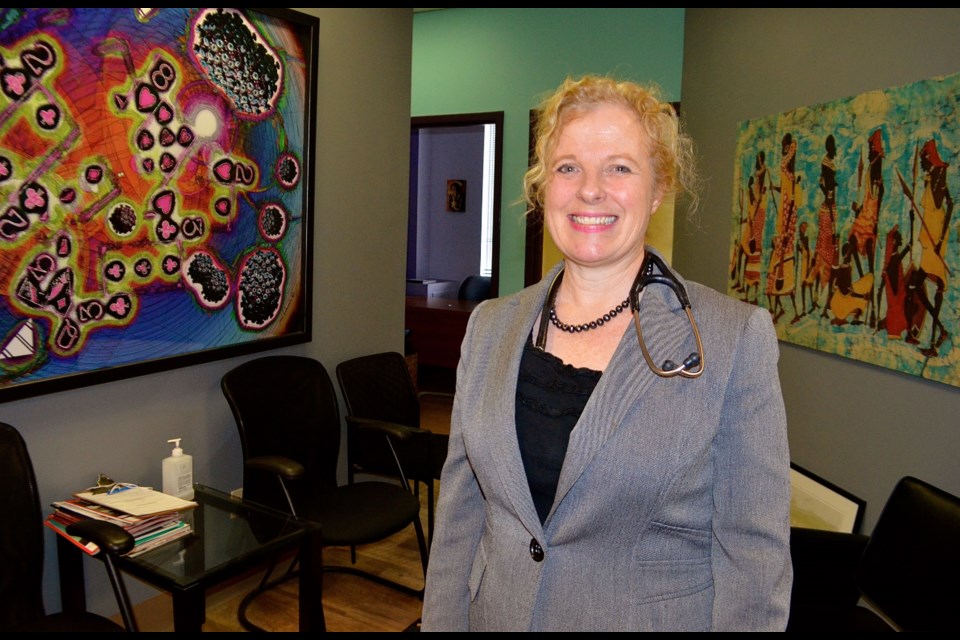When GuelphToday last spoke with Dr. Anne-Marie Zajdlik she shared her story of leading a fundraising campaign that saved thousands of lives and restored hope for people in the country of Lesotho in Southern Africa.
In 2005 Lesotho was in the middle of an HIV-AIDS epidemic that had killed thousands and threatened a third of the country’s population. It was, in many people’s opinion, a hopeless situation.
The Bracelet of Hope campaign raised more than $1 million from donations and fundraising events in and around Guelph.
“That money went toward the first HIV clinic in Lesotho and it kept 11,000 people on treatment for the year 2009,” Zajdlik told us. “That is Guelph’s claim to fame. Guelph did that and many of those 11,000 people are still alive today because of that effort.”
The work has continued to this day.
“Our goal is to end AIDS in Lesotho and that might seem like a crazy goal but it’s not,” said Zajdlik. “We now have treatments that are easy to take. It’s one pill once a day. The treatments don’t kill people. When you are on treatment you can’t transmit. That is huge for us.”
A lot of ground has been covered but, the journey isn’t over, and the focus is now on building mobile health units that can reach remote communities in Lesotho.
Zajdlik has come to symbolize the power of hope in action and what is a more fitting symbol of her tireless efforts than the cycle-a-thon she completes every year.
“I do that every fall on the Elora Cataract Trail,” she said. “It is usually 100k but this year I had a bit of a knee injury so, I only did 50k. I postponed it until close to the end of October just before it got very cold. I am happy I didn’t wait any longer because I’m not cycling in the snow. I draw the line there. I was done on the last Saturday of October and raised $11,200 the last time I looked. This is going toward the next mobile health unit.”
Bracelet of Hope’s 8th Annual World AIDS Day Gala on November 30 in the Frank Hasenfratz Centre For Excellence in Manufacturing at 700 Woodlawn Rd is an opportunity to raise more money for the campaign and celebrate the progress made over the previous year.
“It is usually on or as close as we can get to December 1, which is World AIDS Day,” said Zajdlik. “Usually we have about 150 people in attendance. We raised $60,000 last year and the goal this year is to raise $100,000. Again, the funds raised at this event will go towards more mobile health units. So, the goal is to purchase six in total.”
The gala will include speakers, raffles, auctions and live entertainment.
“We have an auctioneer that’s coming,” said Zajdlik. “We have a lot of live auction and silent auction items this year. There is a jazz band playing and speakers. It is fairly casual because we’d like people to let their hair down and have a good time. I think we have a few tables left. Most of them are full and we just added a couple more tables today.”
People can go online to www.braceletofhope.ca to purchase tickets or they can drop into the office at 21 Yarmouth St and get tickets there as well.
Zajdlik’s work in Africa has given her an international profile and earned her honorary doctorates, medals and many more awards but she is also very active treating HIV-AIDS patients here in Guelph.
Through her work as a family doctor in Guelph she treats many young people and she fears she is witnessing the rise of a different type of epidemic.
“I’ve never prescribed as many anti-depressant medications to young people as I have over the last five or six years, maybe a little bit longer,” she said. “There are many reasons for that but when I talk to them, they talk about a sense of hopelessness.”
Some have sought even more drastic medical options.
“A lot of 20 somethings are looking to have operations and sterilization procedures because they don’t want to have kids,” she said. “They can’t imagine bringing kids into this world. I have never seen this before.”
Zajdlik has written about her concerns in her blog https://braceletofhope.blogspot.com/2019/11/incredible-support-towards-ending-aids.htm
“There seems to be a lot of millennials responding to the blog because my concern is for the teens and the 20 somethings,” she said. “I am treating so many of them for depression and I think they are terrified for how the world is and I am a firm believer that we can turn things around, but we have to work together.”
She sees comparisons to the challenges she and others faced in changing attitudes about AIDS and defeating stigma and political polarization.
“You have to stay non-partisan,” she said. “This is healthcare. This is human health and human life and it goes above all of that.”
She said the threat of climate change combined with partisan spectacle such as the impeachment crisis in the United States are destroying faith in our institutions.
“America is the bastion of justice and democracy so, what is happening,” she asked? “The disrespect and the lack of civility. That has an effect on young people too. Why look forward to the future when there isn’t going to be one? Why trust or rely on our systems if those systems are falling apart or they are led by individuals that we can’t respect?”
We need to lead by example.
“As many of us as possible need to stand up and say, wait, there are still really good people in the world that want to do good things and just grab on to a cause that is doing good work and we will change it but a lot of us have to do that,” she said. “We can do that when we work together.”




